










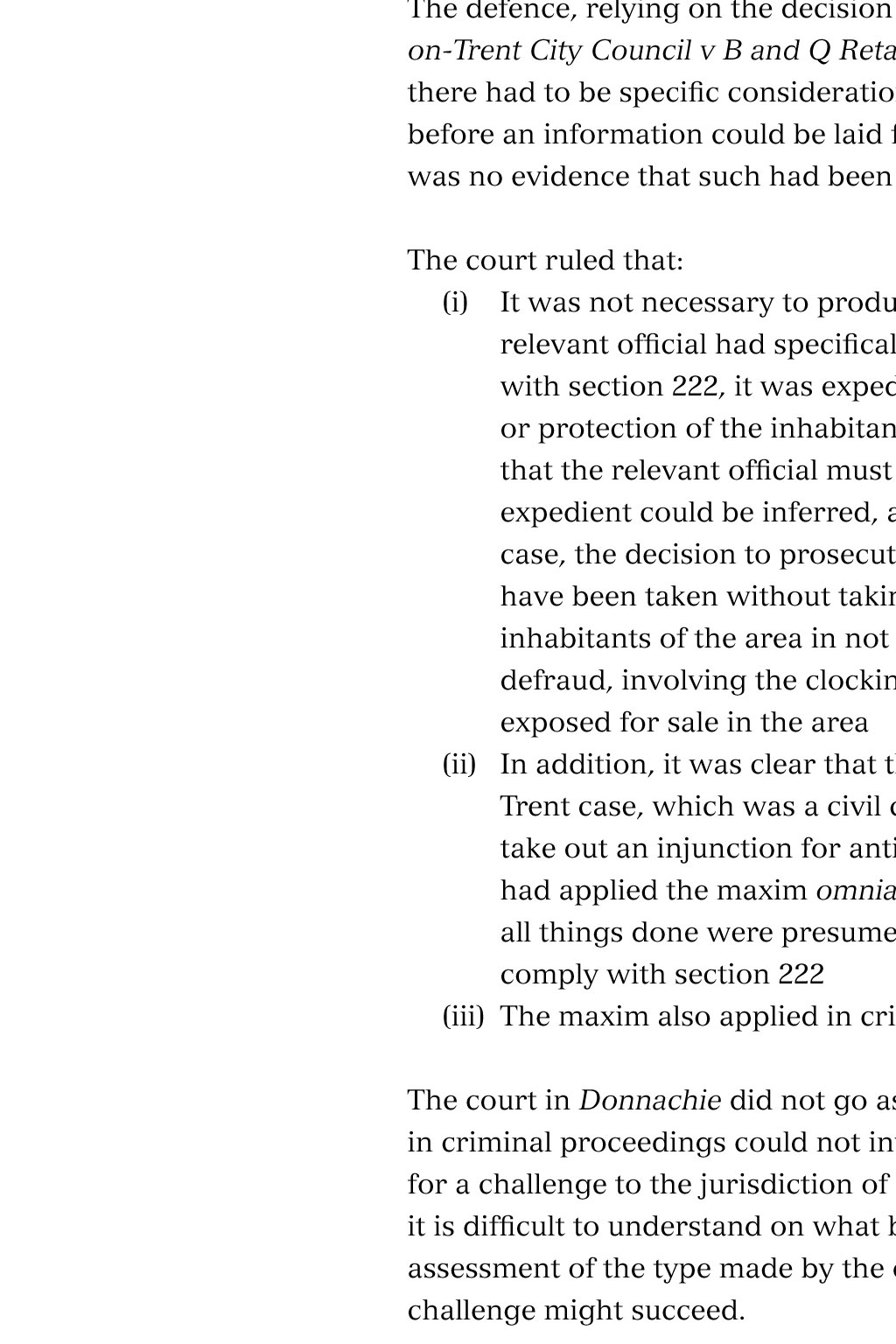
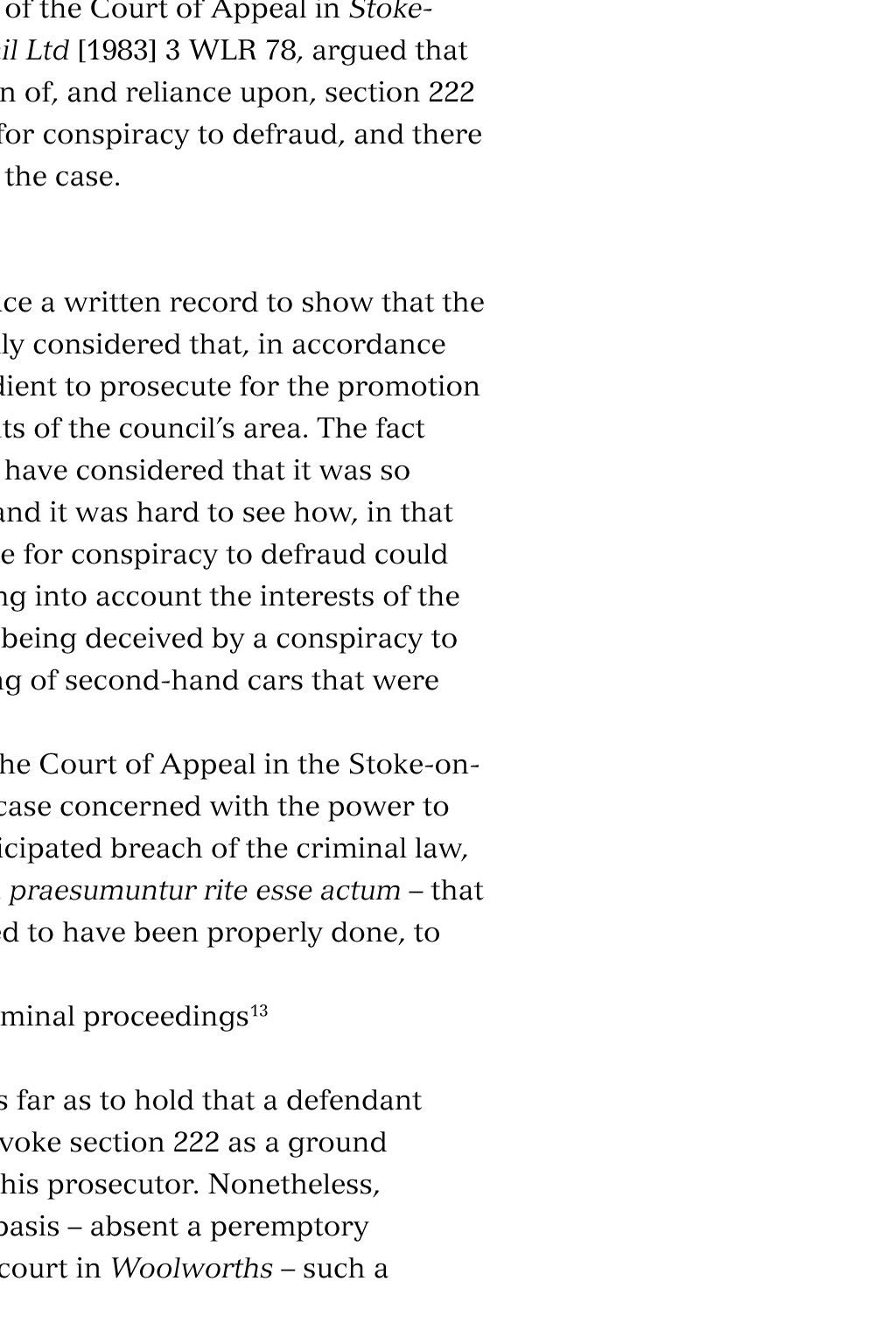
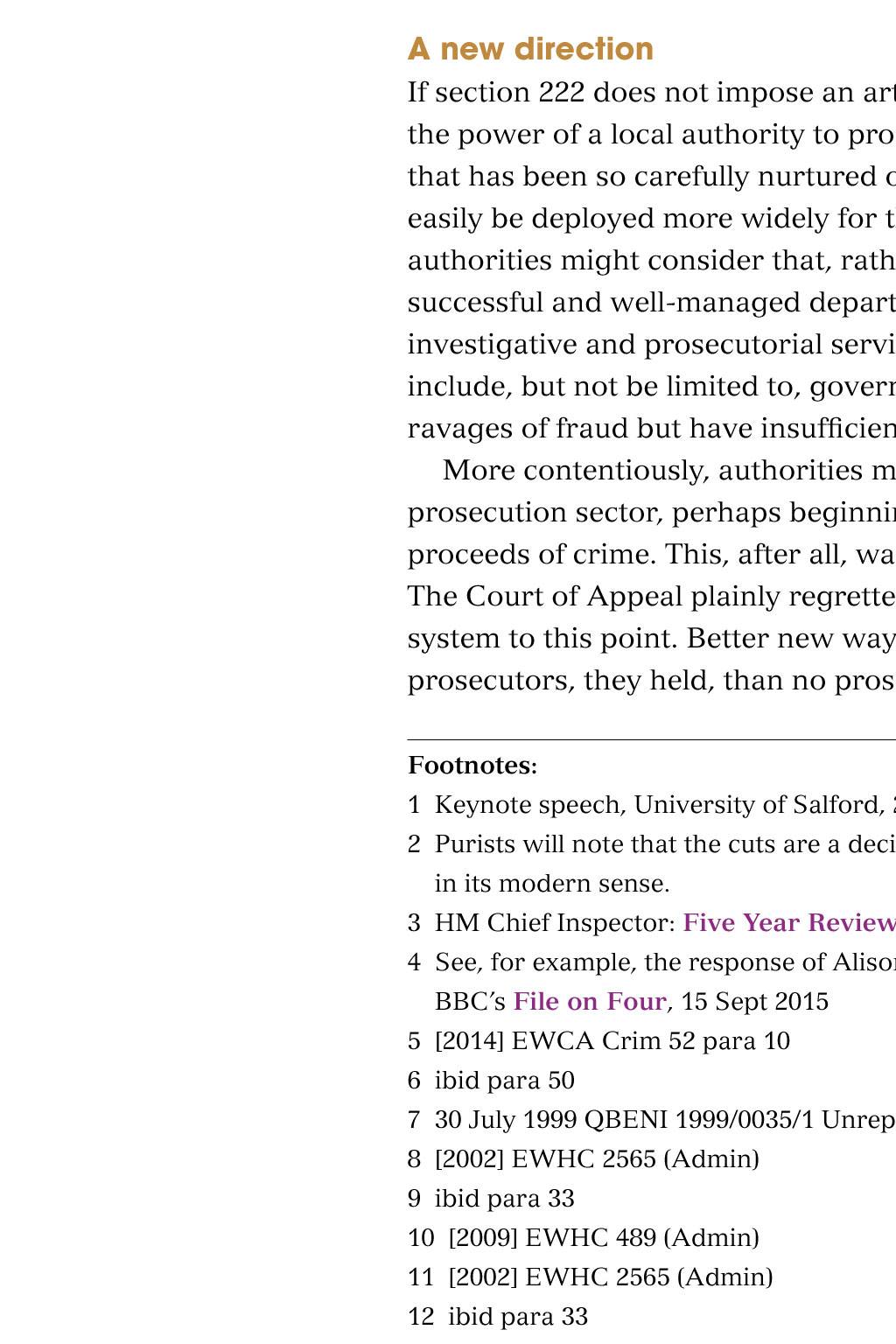
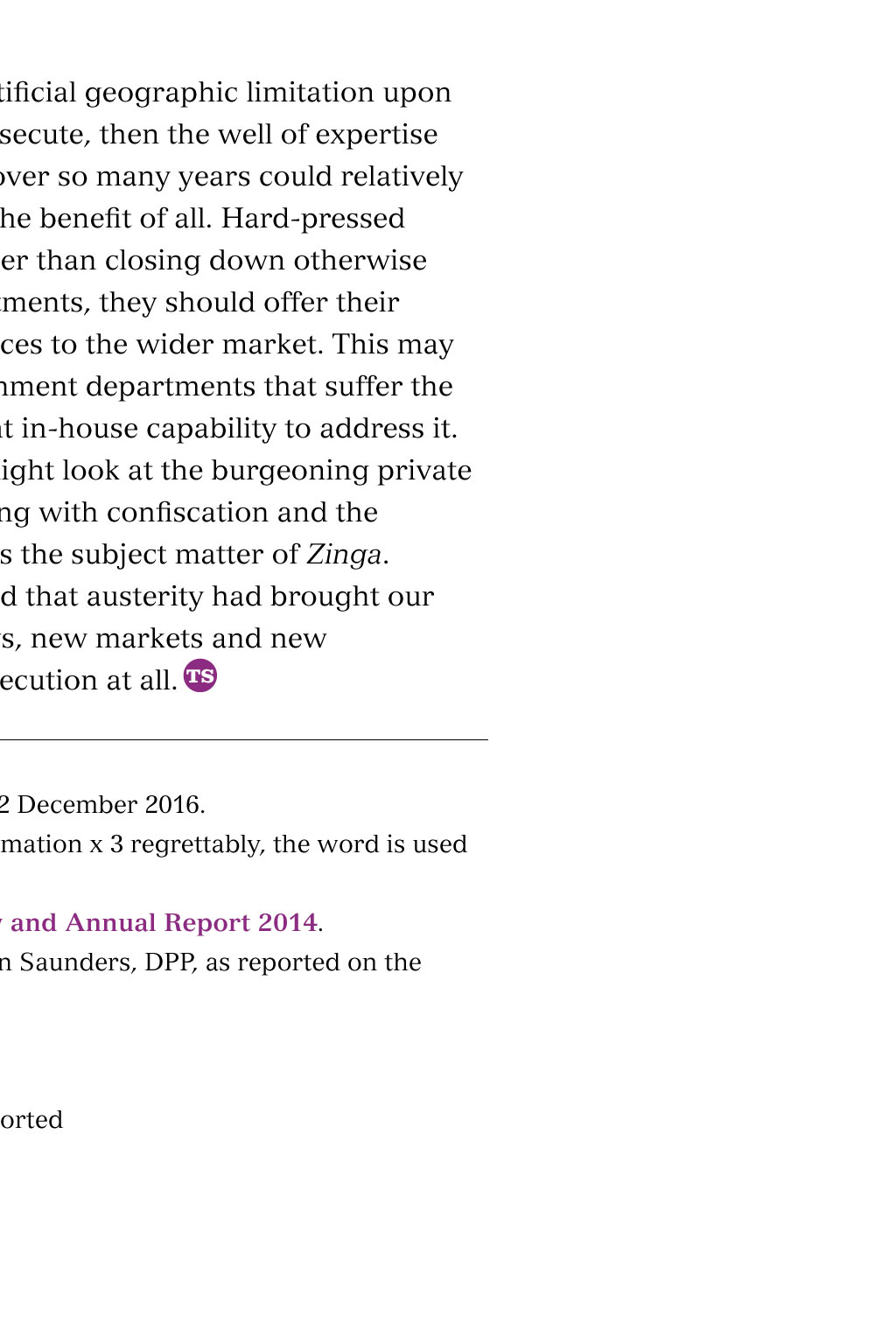
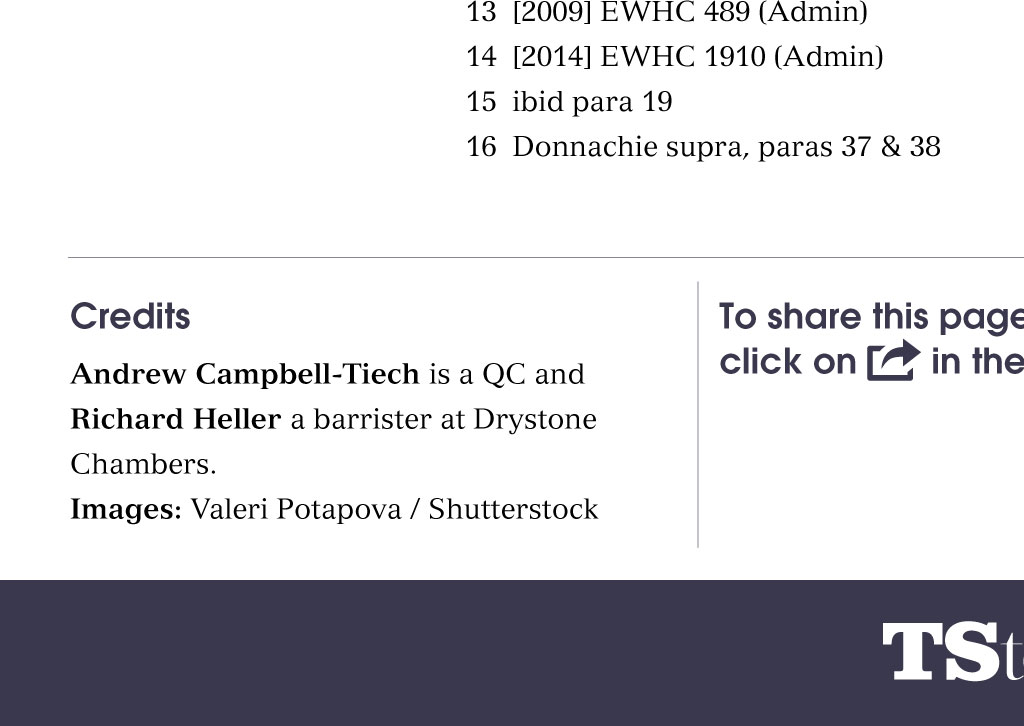



















Legal perspectives: Section 222 Local Government Act 1972 In this feature cuts retrenchment case law Cashing in on opportunity Could local authority expertise help a Criminal Prosecution Service ravaged by cuts? Andrew Campbell-Tiech QC and Richard Heller make their case T here is a new debate about our criminal justice system, announced Kevin McGinty shortly after taking up his post as the most recent chief inspector of the Crown Prosecution Service (CPS). This time, it is not a debate about what we want from it, but rather what we can afford.1 This statement of the obvious is long overdue. The mantra of more for less emanating from every department of government but taken up most enthusiastically by the Ministry of Justice has decimated2 the CPS, which between 2010 and 2014 lost 29.8 per cent of its lawyers and 31.1 per cent of its administrative staff.3 As is to be expected, of course, the current incumbents of managerial positions within the CPS deny that such policies of attrition have dented the services capacity or morale.4 But the Court of Appeal has no doubt about the signicance of the statistics. In Zinga5, the Lord Chief Justice drew attention to the undeniable fact of: Retrenchment of state activity in many areas where the state had previously provided sufcient funds to enable state bodies to conduct such prosecutions. One consequence, as foreseen by the court, is: At a time when the retrenchment of the state is evident in many areas, including the funding of the Crown Prosecution Service and the Serious Fraud Ofce, it seems inevitable that the number of private prosecutions will increase.6 Expertise There is an untapped store of expertise that might well step into the breach. It lies in the prosecuting departments and investigative branches of local authorities. The skills required to disentangle an EC directive and gather the necessary evidence to prevent the mis-selling of medicines as cosmetic products or the mislabelling of foodstuffs, or the clocking of an odometer are the same as those deployed to uncover and prosecute any fraud. Local authorities have a wealth of relevant experience, but it is under-used. Why? Section 222 Local Government Act 1972 The inhibiting factor lies largely in a misunderstanding of the reach and purpose of section 222(1) of the Local Government Act 1972. This curiously drafted section, which begins Part XI of the Act, has the sub-heading Legal Proceedings. Its text has been much cited, but little examined. Power of local authorities to prosecute or defend legal proceedings Where a local authority considers it expedient for the promotion or protection of the interests of the inhabitants of their area they may prosecute or defend or appear in any legal proceedings and, in the case of civil proceedings, may institute them in their own name Subsection (1) contains four elements. The rst is that the power contained within section 222 is to be exercised by a local authority and no other legal person or body. The exercise of that power is by reference to a consideration of expediency. The expediency is the promotion or protection of interests. The interests are those of the inhabitants of the local authoritys area. Provided that the requirements set out in these four elements are satised, then the local authority may, by virtue of subsection 1(a), prosecute in any legal proceedings. Who decides? Hard-pressed authorities might consider that, rather than closing down otherwise successful and well-managed departments, they should offer their investigative and prosecutorial services to the wider market The decision-maker is the local authority, and not the court. A local authority has democratic accountability: courts do not. It is not for the courts, and particularly not for the criminal courts, to second guess the decisions of democratically elected and accountable bodies. The Court of Appeal (Civil Division) in LB Barking & Dagenham v Jones7 treated this proposition as self-evident. Lord Justice Brooke said: The issues that arise for our decision on this appeal can, in my judgment, be dealt with quite shortly. I will start with the second of the judges conclusions. Section 222 of the Local Government Act 1972 gives a local authority power to bring proceedings like these in their own name where they consider it expedient for the promotion or protection of the interests of the inhabitants of their area. It is for the local authority to make this judgment, not for the court, and the judge misdirected himself as to his proper role when he questioned whether the inhabitants of Barking were truly being served by the issue of these proceedings in the way which the section required, and impliedly gave the answer no to that question. The appeal concerned the refusal of the High Court at rst instance to grant the local authority an injunction to restrain repeated mis-selling. But the principle set out is applicable to all proceedings. Unfortunately, in 2002 the Divisional Court took a different view. In Brighton & Hove v Woolworths PLC8, Field, J held, without reference to Barking & Dagenham v Jones nor indeed any authority that in a case that involved alleged multiple breaches of a suspension order in respect of the sale of toy scooters country-wide: In my view, that South Gloucestershire, East Sussex and London had the power to prosecute for the alleged breaches of the suspension notice, which occurred in their areas and that the appellant had no such power. I also accept Mr Haggans submission that the appellant had no power to prosecute, in its own right, breaches of the suspension notice that occurred outside its area because such a prosecution could not ex hypothesi be expedient for the promotion or protection of the interests of the inhabitants of its area as required by section 222(1) of the 1972 Act. 9 Woolworths was clearly wrongly decided. A more respectful formulation is that it should be distinguished and conned to its own facts. This was the approach of the Divisional Court in R (on the application of Donnachie) v Cardiff Magistrates Court,10 and latterly, Justice Phillips, in Oldham MBC v Worldwide Marketing Solutions Ltd.11 S.222(1), the court held, should be broadly construed: It was not necessary for unlawful trading practices to be practiced upon or otherwise directly affect inhabitants of a local authoritys area in order for that authority to have power to bring proceedings by virtue of S.222(1): the subsection entitles the local authority to take a far broader view of the interests of the inhabitants of its area.12 Who may challenge? May a defendant in criminal proceedings brought by a local authority challenge the jurisdiction of his prosecutor by reference to section 222? This question was touched upon in Donnachie. The court observed that section 222 had been the subject of consideration on two occasions by the Court of Appeal, Criminal Division: Jarrett and Steward (unreported 30 January 1997) was concerned with the issue of whether a local authority could prosecute for a conspiracy to defraud, when the underlying offences were breaches of the 1968 Act. The prosecution had relied on section 222 of the 1972 Act. The defence had asserted that section 222 was limited to matters such as nuisance, highways and boundary disputes. The conviction was upheld. In giving the judgment of the court, Lord Justice Rose referred to the terms of section 222(1), and said: So far as that section is concerned, there is, in our judgment, no warrant for limiting in any way the words of the section which, on their face, are extremely wide. It is to be noticed that what is of signicance is whether the local authority consider it expedient for the protection of the interests of the inhabitants in the area. It is to be noted that they may prosecute any legal proceedings. In our judgment there is no warrant for limiting the words of that section in the way which (counsel) suggests. R v Richards [1999] Crim LR 598 was another case in which the local authority had charged an offence of conspiracy to defraud when the underlying offences were breaches of the 1968 Act. The prosecution, relying upon Jarrett v Steward (above) asserted that section 222 applied. The defence, relying on the decision of the Court of Appeal in Stokeon-Trent City Council v B and Q Retail Ltd [1983] 3 WLR 78, argued that there had to be specic consideration of, and reliance upon, section 222 before an information could be laid for conspiracy to defraud, and there was no evidence that such had been the case. The court ruled that: (i) It was not necessary to produce a written record to show that the relevant ofcial had specically considered that, in accordance with section 222, it was expedient to prosecute for the promotion or protection of the inhabitants of the councils area. The fact that the relevant ofcial must have considered that it was so expedient could be inferred, and it was hard to see how, in that case, the decision to prosecute for conspiracy to defraud could have been taken without taking into account the interests of the inhabitants of the area in not being deceived by a conspiracy to defraud, involving the clocking of second-hand cars that were exposed for sale in the area (ii) In addition, it was clear that the Court of Appeal in the Stoke-onTrent case, which was a civil case concerned with the power to take out an injunction for anticipated breach of the criminal law, had applied the maxim omnia praesumuntur rite esse actum that all things done were presumed to have been properly done, to comply with section 222 (iii) The maxim also applied in criminal proceedings13 The court in Donnachie did not go as far as to hold that a defendant in criminal proceedings could not invoke section 222 as a ground for a challenge to the jurisdiction of his prosecutor. Nonetheless, it is difcult to understand on what basis absent a peremptory assessment of the type made by the court in Woolworths such a challenge might succeed. A new direction If section 222 does not impose an articial geographic limitation upon the power of a local authority to prosecute, then the well of expertise that has been so carefully nurtured over so many years could relatively easily be deployed more widely for the benet of all. Hard-pressed authorities might consider that, rather than closing down otherwise successful and well-managed departments, they should offer their investigative and prosecutorial services to the wider market. This may include, but not be limited to, government departments that suffer the ravages of fraud but have insufcient in-house capability to address it. More contentiously, authorities might look at the burgeoning private prosecution sector, perhaps beginning with conscation and the proceeds of crime. This, after all, was the subject matter of Zinga. The Court of Appeal plainly regretted that austerity had brought our system to this point. Better new ways, new markets and new prosecutors, they held, than no prosecution at all. Footnotes: 1 Keynote speech, University of Salford, 2 December 2016. 2 Purists will note that the cuts are a decimation x 3 regrettably, the word is used in its modern sense. 3 HM Chief Inspector: Five Year Review and Annual Report 2014. 4 See, for example, the response of Alison Saunders, DPP, as reported on the BBCs File on Four, 15 Sept 2015 5 [2014] EWCA Crim 52 para 10 6 ibid para 50 7 30 July 1999 QBENI 1999/0035/1 Unreported 8 [2002] EWHC 2565 (Admin) 9 ibid para 33 10 [2009] EWHC 489 (Admin) 11 [2002] EWHC 2565 (Admin) 12 ibid para 33 13 [2009] EWHC 489 (Admin) 14 [2014] EWHC 1910 (Admin) 15 ibid para 19 16 Donnachie supra, paras 37 & 38 Credits Andrew Campbell-Tiech is a QC and Richard Heller a barrister at Drystone Chambers. Images: Valeri Potapova / Shutterstock To share this page, in the toolbar click on You might also like Its all in a name July 2016